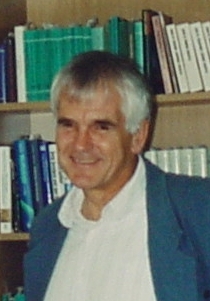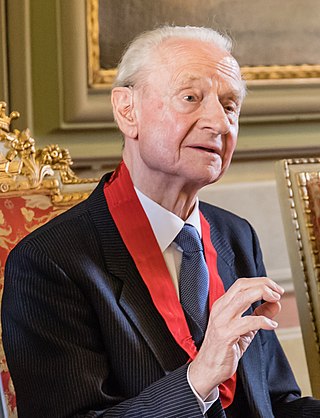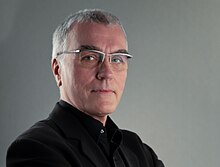
Karl Robert Eduard von Hartmann was a German philosopher, independent scholar and writer. He was the author of the influential Philosophy of the Unconscious (1869). Von Hartmann's notable ideas include the theory of the Unconscious and a pessimistic interpretation of the "best of all possible worlds" concept in metaphysics.
Ansgar Beckermann is a German philosopher who deals primarily with philosophy of mind and epistemology. He is professor for philosophy at the University of Bielefeld and was the president of the "Gesellschaft für analytische Philosophie". Beckermann is known for his arguments for physicalism and his discussion of the concept of emergence.

Romano Guardini was an Italian, naturalized German Catholic priest, philosopher and theologian.
Reinhart Klemens Maurer is a philosopher and professor from Xanten, Germany.
Kevin Mulligan is a British philosopher, working on ontology, the philosophy of mind, and Austrian philosophy. He is currently Honorary Professor at the University of Geneva, Full Professor at the University of Italian Switzerland, Director of Research at the Institute of Philosophy of Lugano, and member of the Academia Europaea and of the Royal Swedish Academy of Letters. He is also known for his work with Peter Simons and Barry Smith on metaphysics and the history of Austrian philosophy.
Manfred Frank is a German philosopher, emeritus professor of philosophy at the University of Tübingen. His work focuses on German idealism, romanticism, and the concepts of subjectivity and self-consciousness. His 950-page study of German romanticism, Unendliche Annäherung, has been described as "the most comprehensive and thoroughgoing study of early German romanticism" and "surely one of the most important books from the post-War period on the history of German philosophy." He has also written at length on analytic philosophy and recent French philosophy.

The following list of works by German philosopher Georg Wilhelm Friedrich Hegel (1770–1831).
Hans Lenk was a German rower who competed for the United Team of Germany in the 1960 Summer Olympics, and an Emeritus Professor of Philosophy. He was born in Berlin.

Julian Nida-Rümelin is a German philosopher and public intellectual. He served as State Minister for Culture of the Federal Republic of Germany under Chancellor Schröder. He was professor of philosophy and political theory at the Ludwig Maximilian University of Munich until 2020. Nida-Rümelin is vice chairman of the German Ethics Council.

Arno Ros is a German philosopher and Professor of Theoretical Philosophy at the Otto-von-Guericke University Magdeburg in Magdeburg, Germany.

Pirmin Stekeler-Weithofer is a German philosopher and professor of theoretical philosophy at the university of Leipzig. He was the president of the international Ludwig Wittgenstein society (2006-2009) and is now a vice-president of this institution.
Martine Nida-Rümelin is a German philosopher.
Otto Pöggeler was a German philosopher. He specialized in phenomenology and commenting on Heidegger. In 1963 he authored the acclaimed Martin Heidegger’s Path of Thinking, one of the first rigorous attempts at tracing the development of Heidegger's thought. He also published a study of poetry of Paul Celan, and was director of the Hegel-Archiv at the Ruhr University in Bochum.

Markus Gabriel is a German philosopher and author at the University of Bonn. In addition to his more specialized work, he has also written popular books about philosophical issues.
Andreas Kemmerling is a German philosopher. He works in the analytic tradition.

Jan Wagner is a German poet, essayist and translator, recipient of the Georg Büchner Prize and Leipzig Book Fair Prize.

Friedrich-Wilhelm von Herrmann was a German philosopher. He was known for his expertise on Heidegger's thought, having worked with him at the University of Freiburg from 1972 to 1976. Herrmann taught there as professor from 1979 to 1999.
Wolfgang Cramer was a German philosopher and mathematician.
Reinhard Mehring is a German political scientist and philosopher who has written extensively on Carl Schmitt.
Udo Thiel is a German Philosopher and Professor i. R. at the Department of Philosophy at the University of Graz, Austria. He studied philosophy at the Universities of Marburg, Bonn and Oxford. In 1982 he completed his doctorate under the supervision of Hans Wagner at the University of Bonn. Prior to his appointment as professor of the history of philosophy at the University of Graz in 2009, he held positions at the University of Sydney and the Australian National University in Canberra. Since November 2022 he has been a Visitor at the Department of Philosophy at the University of Bonn. His research focuses on seventeenth- and eighteenth-century epistemology, metaphysics and philosophy of mind. He is a member of the Editorial Board of Locke Studies. In 2013 Udo Thiel was elected a Corresponding Member of the Austrian Academy of Sciences (ÖAW). In 2014 he received the Styrian government Award (Forschungspreis) for his research in early modern philosophy.








